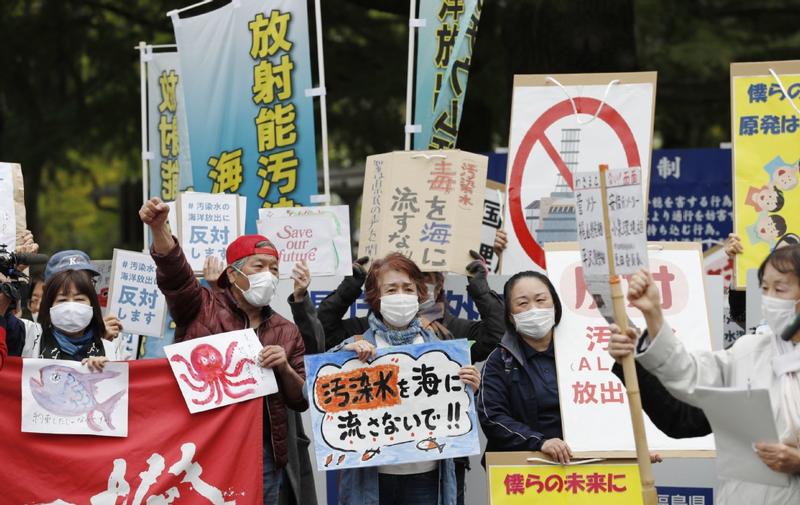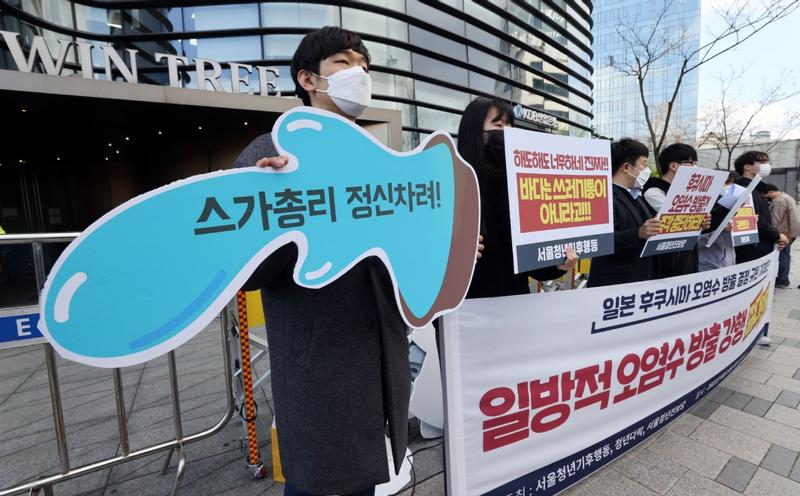 Japanese protesters gather outside government offices in the city of Fukushima on April 13, 2021, in opposition to a decision to dump contaminated water into the sea in their prefecture. (PHOTO PROVIDED TO CHINA DAILY)
Japanese protesters gather outside government offices in the city of Fukushima on April 13, 2021, in opposition to a decision to dump contaminated water into the sea in their prefecture. (PHOTO PROVIDED TO CHINA DAILY)
Dumping contaminated wastewater into the sea may be the cheapest way for Japan to deal with its wrecked Fukushima nuclear plant, but the government's decision is shortsighted and hints at geopolitical maneuverings with the support of the US for the move.
Tokyo announced on Tuesday that it plans to start releasing massive amounts of the radioactive water-stored in tanks at the tsunami-devastated Fukushima Daiichi nuclear plant-after two years. The decision has brought to a head longtime fears both in and outside Japan that the government would proceed with a plan flagged years earlier.
READ MORE: Japan to dump Fukushima water into sea amid opposition
Although Japan claimed that the government would work to make sure the wastewater is safe and help domestic enterprises engaged in agriculture, fisheries and tourism, the Japan-centric action stirred up widely held concerns that people everywhere will be harmed.
Modern science can help dilute and reduce the radioactive isotopes in the wastewater, but it cannot eliminate all the radioactive substances from the water.
Zhou Yongsheng, Professor and deputy director of Japanese Studies Center, China Foreign Affairs University
Given the prospect of unprecedented levels of contaminants harming the marine life and biosystems of the Pacific Ocean, the damage would initially be felt in the Pacific area before spreading farther afield, said Zhou Yongsheng, professor and deputy director of Japanese Studies Center at the China Foreign Affairs University.
Zhou believes the damage would eventually become a catastrophe for the global community.
Japan's action would not only harm the country's own fisheries, but also damage the fisheries and aquaculture industries of countries in East and Southeast Asia-and even North America-on a large scale, Zhou said.
"Especially for those countries that heavily depend on desalinated seawater as drinking water, the effect could be more direct and serious to the people," he said. "Modern science can help dilute and reduce the radioactive isotopes in the wastewater, but it cannot eliminate all the radioactive substances from the water."
In the long run, no single country will be able to escape the radioactive storm set in motion by release of the contaminated wastewater.
ALSO READ: Water discharge call draws fire
When asked why the issue has aroused little concern in Western media reports, Zhou believes the reason that Europeans have not raised strong objections is their apparent belief that they will not be affected, at least in the short term, given the continent's distance from Japan.
However, the US, which Zhou said will become a victim of the ocean-carried contamination, will not suppress Japan on this issue as it is "trying its best to draw Japan against China", Zhou said.
China's Foreign Ministry spokesman Zhao Lijian said the disposal of nuclear wastewater from the nuclear plant is "related to the international marine environment, food safety and human health".
He also said the US appears to have always attached importance to environmental issues, and it is hoped that the US will avoid double standards or bias on this specific "real environmental issue".
Zhao's comments came as the US State Department said on its website that Japan "appears to have adopted an approach in accordance with globally accepted nuclear safety standards" in relation to its sea disposal plans.
But Zhao said: "International authorities and experts have clearly pointed out that the discharge of tritium-contaminated wastewater from the Fukushima nuclear power plant into the ocean will affect the marine environment and the public health of neighboring countries."
He added that the existing treated wastewater contains contaminants such as radionuclides and needs to be further purified and treated.
READ MORE: China seriously concerned about Fukushima water disposal
 South Koreans make clear their health concerns over Japan's wastewater decision in a protest outside the Japanese embassy in Seoul on April 13, 2021. (PHOTO PROVIDED TO CHINA DAILY)
South Koreans make clear their health concerns over Japan's wastewater decision in a protest outside the Japanese embassy in Seoul on April 13, 2021. (PHOTO PROVIDED TO CHINA DAILY)
Strong regret
South Korea on Tuesday expressed strong regret over Japan's decision.
Koo Yoon-cheol, head of South Korea's Office for Government Policy Coordination, called an emergency vice-ministerial meeting of officials to discuss Seoul's response, according to the Yonhap News Agency.
The (South Korean) government expresses strong regret over the Japanese government's decision to release contaminated water from the Fukushima nuclear plant into the ocean.
Koo Yoon-cheol, Head of South Korea's Office for Government Policy Coordination
"The government expresses strong regret over the Japanese government's decision to release contaminated water from the Fukushima nuclear plant into the ocean," Koo said.
READ MORE: S. Korea summons Japan envoy over Fukushima water decision
The official also said the government will refer its concerns to the International Atomic Energy Agency and request the international community to objectively review safety issues related to the Fukushima water release.
South Korean civic groups also on Tuesday asked Japan to reverse its decision to release contaminated water, denouncing the move as nuclear terrorism.
In a statement, an alliance of 31 anti-nuclear and environmental civic groups warned that the discharge would become an irreparable disaster for humans, well beyond the impact on the marine ecosystem.
"The Japanese government said it will gradually release radioactive water after diluting it to a level that is harmless to the human body. But diluting will not change the total amount of radioactive materials released into the sea," reads the statement.
READ MORE: Ten years after Fukushima, Japan remembers 'man-made' disaster
Greenpeace, a nongovernmental environmental organization with its headquarters in the Netherlands, on Tuesday said Japan's decision completely "disregards the human rights and interests of the people in Fukushima, wider Japan and the Asia-Pacific region".
"The Japanese government has once again failed the people of Fukushima," said Kazue Suzuki, climate and energy campaigner at Greenpeace Japan.
"The government has taken the wholly unjustified decision to deliberately contaminate the Pacific Ocean with radioactive wastes."


